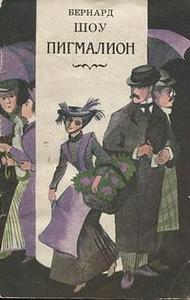Take a photo of a barcode or cover
“I sold flowers. I didn't sell myself. Now you've made a lady of me I'm not fit to sell anything else.”
-
A witty and revealing play with dynamic characters and so many great quotes.
-
“Galatea never does quite like Pygmalion: his relation to her is too godlike to be altogether agreeable.”
-
A witty and revealing play with dynamic characters and so many great quotes.
-
“Galatea never does quite like Pygmalion: his relation to her is too godlike to be altogether agreeable.”
When I finished Act I and started with Act II, I began to muse, this reads like 'My Fair lady'.
After Act II, I was certain, this was exactly like My Fair Lady.
After Act II, I was certain, this was exactly like My Fair Lady.
higgins is a HOMOSEXUAL!!! wdym you’re forever an old bachelor and you’re living with your other old bachelor friend “for no reason lol just to teach eliza there’s no other reason”
informative
inspiring
lighthearted
fast-paced
Plot or Character Driven:
Character
Strong character development:
Yes
Loveable characters:
Yes
Diverse cast of characters:
No
Flaws of characters a main focus:
Yes
Pygmalion
by George Bernard Shaw
1916
Washington Square Press
3.9 / 5
When Henry Higgins, a linguist, meets cockney flower girl Eliza Doolittle, he makes a bet with his friend Colonel Pickering that he can teach her to speak such perfect English that she could pass as a duchess in polite High Society.
He forgets that Eliza is an independent woman, and will not be bought and coddled.
Classified under the genre of romance by many, to me, it was also a study of class relations and the perceptions and attitudes towards gender that were prevailing at that time, early 1900's.
I really enjoyed the book, but gave it only 3.9 stars. Why? Henry Higgins. The characters are so well developed with a depth and diversity, I felt an instant understanding of them. I just did not like Higgins. At all.
This was first a stage play, introduced to the public in 1913, and first printed in 1914. This went on to be the musical 'My Fair Lady' and is an unforgettable book.
by George Bernard Shaw
1916
Washington Square Press
3.9 / 5
When Henry Higgins, a linguist, meets cockney flower girl Eliza Doolittle, he makes a bet with his friend Colonel Pickering that he can teach her to speak such perfect English that she could pass as a duchess in polite High Society.
He forgets that Eliza is an independent woman, and will not be bought and coddled.
Classified under the genre of romance by many, to me, it was also a study of class relations and the perceptions and attitudes towards gender that were prevailing at that time, early 1900's.
I really enjoyed the book, but gave it only 3.9 stars. Why? Henry Higgins. The characters are so well developed with a depth and diversity, I felt an instant understanding of them. I just did not like Higgins. At all.
This was first a stage play, introduced to the public in 1913, and first printed in 1914. This went on to be the musical 'My Fair Lady' and is an unforgettable book.
Loved it! A great short play that had me flippin’ pages like a madman, enjoying my journey.
The last act was a little odd, but the ending was *muah*.
Honestly, the title of the book and the fact that I had never heard of it really turned me off, but as soon as I dove in, my thoughts changed right away. Give it a whirl!
The last act was a little odd, but the ending was *muah*.
Honestly, the title of the book and the fact that I had never heard of it really turned me off, but as soon as I dove in, my thoughts changed right away. Give it a whirl!
De vindingrijke hervertelling van een oude Griekse mythe, later geadapteerd tot de populaire musical My Fair Lady.
Het verhaal boeide me al toen ik in de tweede klas hier een verkorte versie van zag, en ik had lang het voornemen het stuk in zijn geheel te lezen. Het idee dat mensen kunnen worden omgevormd, en dan met name via taal, intrigeert me. Zeker wanneer je hier machtsrelaties bij betrekt. Twee hoge heren leren een meisje van lage stand hoe degelijk te spreken. Het gaat hier duidelijk om prestige; de manier van spreken van de machtige is de 'juiste' manier, en via taal leer je ook 'juiste' manier van denken.
Ik vond het daarom heel verrassend dat de meesterlijke taalkundige Higgins zo'n gigantische klootzak is, en dat hij niets geeft om manieren. Op het eerste gezicht spreekt dit het idee tegen dat er een samenhang is tussen taal en wil. Maar Higgins is meer een uitzondering. Als gigantische cynicus ziet hij het allemaal als spel. Hij ziet de onzinnigheid in van het machtsvertoon van de hogere klasse (al profiteert hij er wel van). Hij wil niet dat iedereen spreekt als de elite, dat zou enkel de taalkundige diversiteit verminderen. Hij neemt de uitdaging alleen aan om zijn talenten te tonen. Hierdoor adopteert Eliza weliswaar de taal van de elite, maar niet de manieren.
En wanneer het spel klaar is, staat ze in een moeilijke situatie. Ze heeft geleefd in de illusie van de elite, maar weet dat dat haar leven niet is. Ze kan niet terug naar een armoedig bestaan, maar ook niet echt verder in het welvarende leven (behalve misschien als echtgenote van een rijke man, wat het seksistische in het verhaal benadrukt). Haar verlangens zijn gevormd naar het prestigieuze, maar voor haar is die nagenoeg onbereikbaar.
Het eindigt gelukkig goed voor haar, met het huwelijk tussen haar en Freddy. Al met al een menselijk en geruststellend einde. Dit stuk voelde voor me ook als een pleidooi voor menselijkheid. Eliza's was woedend op Higgins omdat hij haar enkel zag als een pronkstuk, een machine. En hier slaat het terug op de Griekse mythe. De liefde van Pygmalion voor zijn standbeeld was er een van macht, van bezit, van trots. Het dehumaniseert het object. Eliza is echter geen machine, maar nog steeds mens, en kiest voor Freddy. Die is niet in staat haar te veranderen, maar is gewoon lief voor haar. De boodschap is lief en simpel: liefde is geen krampachtige beeldvorming in romantische idealen; het is nooit dwingend en altijd ongedwongen.
Oh, en Eliza's vader is een briljant bijpersoon.
Het verhaal boeide me al toen ik in de tweede klas hier een verkorte versie van zag, en ik had lang het voornemen het stuk in zijn geheel te lezen. Het idee dat mensen kunnen worden omgevormd, en dan met name via taal, intrigeert me. Zeker wanneer je hier machtsrelaties bij betrekt. Twee hoge heren leren een meisje van lage stand hoe degelijk te spreken. Het gaat hier duidelijk om prestige; de manier van spreken van de machtige is de 'juiste' manier, en via taal leer je ook 'juiste' manier van denken.
Ik vond het daarom heel verrassend dat de meesterlijke taalkundige Higgins zo'n gigantische klootzak is, en dat hij niets geeft om manieren. Op het eerste gezicht spreekt dit het idee tegen dat er een samenhang is tussen taal en wil. Maar Higgins is meer een uitzondering. Als gigantische cynicus ziet hij het allemaal als spel. Hij ziet de onzinnigheid in van het machtsvertoon van de hogere klasse (al profiteert hij er wel van). Hij wil niet dat iedereen spreekt als de elite, dat zou enkel de taalkundige diversiteit verminderen. Hij neemt de uitdaging alleen aan om zijn talenten te tonen. Hierdoor adopteert Eliza weliswaar de taal van de elite, maar niet de manieren.
En wanneer het spel klaar is, staat ze in een moeilijke situatie. Ze heeft geleefd in de illusie van de elite, maar weet dat dat haar leven niet is. Ze kan niet terug naar een armoedig bestaan, maar ook niet echt verder in het welvarende leven (behalve misschien als echtgenote van een rijke man, wat het seksistische in het verhaal benadrukt). Haar verlangens zijn gevormd naar het prestigieuze, maar voor haar is die nagenoeg onbereikbaar.
Het eindigt gelukkig goed voor haar, met het huwelijk tussen haar en Freddy. Al met al een menselijk en geruststellend einde. Dit stuk voelde voor me ook als een pleidooi voor menselijkheid. Eliza's was woedend op Higgins omdat hij haar enkel zag als een pronkstuk, een machine. En hier slaat het terug op de Griekse mythe. De liefde van Pygmalion voor zijn standbeeld was er een van macht, van bezit, van trots. Het dehumaniseert het object. Eliza is echter geen machine, maar nog steeds mens, en kiest voor Freddy. Die is niet in staat haar te veranderen, maar is gewoon lief voor haar. De boodschap is lief en simpel: liefde is geen krampachtige beeldvorming in romantische idealen; het is nooit dwingend en altijd ongedwongen.
Oh, en Eliza's vader is een briljant bijpersoon.
I love My Fair Lady and I had thought that I'd read this before, but I was pleasantly surprised to find that this must have been a first read for me. I found this quite humorous and loved the discussion of how there is a class divide based on one's speech. The idea of bettering oneself through improving speech was also interesting, especially since it becomes a question of it there is real betterment. The discussion of freedoms, gender roles, and the importance of affection (regardless of what kind) was also very fun.
For: readers looking for a classic play about the class struggle in England via language/dialect.
Possible red flags: mentions of physical abuse from one's past; bullying; misogyny; classism/class struggles/class discussion.
For: readers looking for a classic play about the class struggle in England via language/dialect.
Possible red flags: mentions of physical abuse from one's past; bullying; misogyny; classism/class struggles/class discussion.





